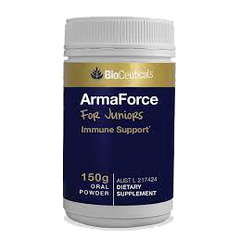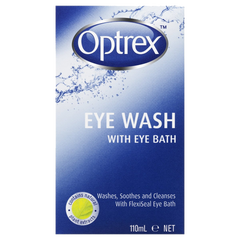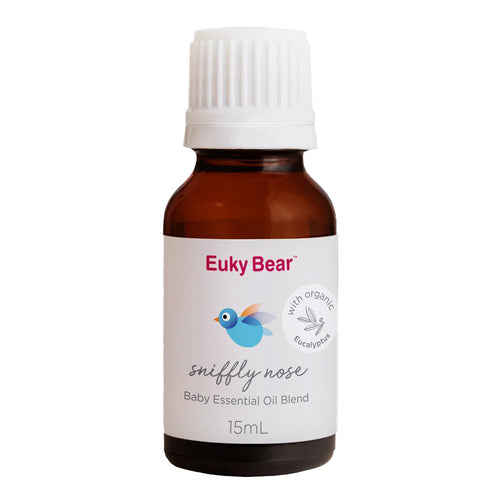Worried your child is suffering with more than just a runny nose? Here’s how to tell if your child has an allergy, and some helpful treatments to keep their allergy symptoms under control. Here's everything you need to know about allergies in children.
Does your child suffer with red rashes, puffy eyes, constant sneezing, wheezing or recurrent stomach upsets? Chances are they’re suffering with an allergy of some form.
But what’s causing their allergy and why?
Here’s how to spot the warning signs and how to keep your child’s allergies from spiralling out of control.
What is an allergy?
Allergies are the body’s reaction to certain substances in the environment. It’s actually the immune system reacting to substances (or allergens) that it deems foreign and harmful to the body, just like it does when germs, viruses and bacteria enter the body — the immune system is there to detect these germs and fight them off.
These ‘foreign’ substances are known as allergens, which can be found in dust mites, pets, pollen, insects, ticks, moulds, foods and some medications. Usually allergens are harmless, but for people with allergies, the immune system overreacts by releasing histamine and other chemicals into the body in an attempt to fight the allergens off. These chemicals can then cause an allergic reaction, such as sneezing, itching, rash, runny eyes and nose etc.
Are allergies severe?
Allergic reactions can vary from mild to severe, and they can differ in severity from person to person. Some allergies, like hayfever, are not serious, but they do cause irritation and/or discomfort, with symptoms ranging from runny or blocked nose, watery, red or itchy eyes, sneezing, coughing and headaches.
There are other allergic reactions, however, that are extremely severe and can be life-threatening. These extreme allergies are what’s known as anaphylaxis — when someone reacts severely to either a certain type of food, insect bites or stings, or medicines. The reaction can often cause a person’s face, lips, tongue and throat to swell, and might cause them to stop breathing. If your child suffers with anaphylaxis you/they will need to carry an EpiPen® with them at all times.
Anaphylaxis is an emergency. If your child has an anaphylactic reaction, it needs to be treated straight away. Call 000 for an ambulance if your child experiences any of the symptoms below:
- difficulty with breathing and/or noisy breathing
- wheeze or persistent cough
- swelling of the tongue
- swelling and/or tightness in the throat
- difficulty talking or hoarse voice
- persistent dizziness or collapse
- becoming pale and floppy (infants/young children).
They could also experience mild to moderate symptoms, including:
- hives, welts or wheals (a red, lumpy rash, like mosquito bites)
- a tingling feeling in or around the mouth
- stomach pain, vomiting and/or diarrhoea (loose or runny poo)
- facial swelling
Even if the symptoms are mild, the first time your child has any allergic reaction, take them straight to your GP. Your doctor will confirm whether your child had an allergic reaction, and advise how to treat the reaction next time it happens. If the reaction was moderate or severe, you may be referred to an allergy specialist.
Your child may experience a more severe reaction the second time they’re exposed to the allergen. So if they do experience even mild symptoms, it’s advised to visit your GP so they can determine what’s causing it.
What kinds of allergies do children suffer from?
There are several different types of allergies that children can suffer from. They range from:
- hayfever or allergic rhinitis (the most common form of allergy among children)
- pet allergies
dust mite allergies - medication allergies
- insect allergies
- latex allergies
- some medications
- food allergies
- chemical allergies and intolerances
What causes allergies?
Allergic reactions are caused by allergens. These allergens disrupt the immune system, causing it to release histamine and other substances into the body. These substances then cause allergy symptoms (or a reaction) such as sneezing, skin rash, itchy eyes, runny nose etc.
These allergens can be triggered by tree, grass, and weed pollens, latex, moulds, dust mites, insect bites/stings, pet hair, dander and saliva, feathers, pests (such as cockroaches and mice) foods (peanuts, eggs, milk and milk products), chemicals (metals and skincare products), irritants (cigarette smoke, perfume, car exhaust) and medicines (eg. penicillin).
What allergy symptoms should I look out for?
An allergic reaction can happen anywhere in the body, including the skin, eyes, lining of the stomach, nose, sinuses, throat, and lungs. These are the places where immune system cells fight off germs that are either inhaled, swallowed, or that come into contact with the skin. Allergic reactions can cause:
- stuffy nose, sneezing, itching, or runny nose, and itching in ears or roof of mouth
- red, itchy, watery eyes
- red, itchy, dry skin
- hives or itchy welts
- itchy rash
- asthma symptoms, such as shortness of breath, coughing, wheezing
- stomach upset
- a severe, life-threatening allergic reaction (anaphylaxis). This can cause trouble breathing, vomiting, diarrhea, low blood pressure, fainting, or death.
Why does my child have an allergy?
Just like adults, any child can develop an allergy at any age. Although allergies are more common among children.
Some children are more susceptible than others, and that really depends on a number of factors including:
-
Genetics — allergies tend to run in families, so if either of your parents suffer with them, the likelihood is, you will too, or you may develop a different allergy. Your parents can pass on the tendency to get allergies, but you may never actually experience any symptoms. Or, you may suffer with allergies, but not the same ones as your parents.
- Your environment — the world around you also plays a big part. If allergies run in your family it means you have a tendency to develop the allergy already. You have to have a tendency AND be exposed to that allergen for an allergy to develop. You’re also more likely to develop that allergy if you’ve been exposed earlier in life, if the exposure is intense, and if you come into contact with that allergen frequently.
Whilst it seems that allergies tend to run in families, the exact reason isn’t yet understood. Allergy symptoms often happen slowly over time, and they can come back after being in remission for many years.
How are allergies diagnosed?
Some allergies are relatively easy to identify but others are less obvious because they can appear similar to other health conditions. Infants and children often experience symptoms that could indicate they have an allergy, like a runny nose or cough, but this could also indicate they have an upper respiratory infection. Our advice is to visit your doctor for a more detailed examination if your child experiences any of the symptoms above.
You should also see your doctor if your child has cold-like symptoms that last longer than a week or two, or if those symptoms occur around the same time every year. Your GP might diagnose an allergy and prescribe medicines, or they may refer you to an allergist (an expert in the treatment of allergies) for allergy tests. These include:
-
Skin test — applying a small amount of a suspected allergen to the skin and watching for a reaction.
-
Blood test — checks your child’s blood for specific antibodies to find out what substances they may be allergic to. Blood tests are an option when skin testing isn’t helpful or possible, such as testing infants or young children, or if your child suffers with an existing skin condition like psoriasis or eczema,.
-
Challenge test — this test is supervised by an allergist. A very small amount of the allergen is given to your child by mouth, or it is breathed in. A challenge test can determine how severe an allergy is. Skin or blood test reactions only tell the likelihood of having any type of reaction, not what that reaction will be.
- Elimination testing — effective for diagnosing food allergies. You remove the trigger food from your child’s diet for several weeks, then carefully watch for symptoms when they eat it again.
For an accurate diagnosis, the allergist will refer to your child’s detailed medical history, along with any family history of allergies or asthma, plus a physical exam and allergy sensitivity testing. They will then advise the most suitable treatments and interventions.
What allergy treatments are available for children?
There are a number of over-the-counter treatments suitable for children. Your doctor or allergist will recommend an appropriate course of treatment depending on what your little one is allergic to, and also what age they are. It will also depend on how severe the condition is.
Generally speaking, antihistamines provide effective relief for a number of allergies, including hayfever, pet, dust and insect allergies, and when symptoms are mild, they are also effective at reducing symptoms relating to food allergies.
Decongestants, nasal sprays and soothing eye drops are also great for treating nasal congestion and other symptoms of colds and allergies, as well as any red, watery or itchy eyes. ** Note that decongestants and nasal sprays are only suitable for children over 6. For children under 6, use saline spray or drops instead.
We asked our pharmacists which over-the-counter treatments they would recommend for children. And to make it even easier for you, we’ve broken down into ages and specific allergy symptoms, so you know which medication is right for your little one.
Newborns - 2 years
Flo Baby Saline Spray 15mL
This gentle, non-medicated nasal saline spray is great for dry noses and unblocking nasal passages as a result of colds, pollens, dust and other allergy-causing particles.
Brauer Baby Saline Nasal Spray with Aspirator
Good for dry noses and unblocking nasal passages. The aspirator makes it application as you can spray easily into your little one’s nose.
 Shop Now
Shop Now
Telfast Kids Oral Liquid 60mL
This raspberry flavoured liquid provides soothing relief for children aged 6 months and over, to treat symptoms of hayfever including sneezing, runny and itchy nose, itchy and watery eyes and itchy throat,. It can also be used for some skin allergies like hives to reduce swelling and itching.
Little Allergies Cetirizine Antihistamine Orange Pineapple 100mL
12-hour relief from allergy and hayfever symptoms including sneezing, runny and itchy nose, itchy and watery eyes and itchy skin. ** Suitable for for children over 1 year.
Children 2+ Years
FESS Children's Nasal Spray 2 Years+ 20mL
This preservative-free saline spray washes away dust, pollen and other allergens, and helps to clear a blocked nose.
Zyrtec Cetirizine Kids Fast Acting Relief Sugar Free Banana 75mL
A great-tasting banana flavoured liquid that provides fast acting relief for allergy and hayfever symptoms, including sneezing, runny and itchy nose, itchy and watery eyes, and itchy skin. Dosage is dependent on your child’s age, so check the instructions carefully. Shop Now
Shop Now
Dimetapp Kids Allergic Rhinitis Colour Free Variant 200mL
Relieves nasal and sinus congestion, and other respiratory allergy symptoms including sneezing, blocked or runny nose, itchy, watery eyes, itchy throat and itchy skin.
Claratyne Children's Hayfever & Allergy Relief Antihistamine Grape Flavoured Chewable Tablets 10 pack
These chewable grape flavoured tablets are great for little ones who can’t take liquid antihistamines. Use for hayfever, allergies and hives.
BioCeuticals ArmaForce For Juniors 150g
Packed with vitamins A and C and zinc, to provide nutritional support for a healthy immune system, and to help reduce the severity and duration of the common cold. These can be taken in conjunction with antihistamines above.

Great for kids of all ages
Vicks BabyBalsam 50g
Infused with fragrances of rosemary, lavender and eucalyptus, and extract of aloe vera and coconut oil to gently moisturise, soothe, calm and relax your baby, if they are suffering with colds, runny nose or congestion.
Euky Bear Sniffly Nose Room Spray 125g
Formulated with natural aromatherapy essential oils including eucalyptus, menthol, rosemary, and oil of Wintergreen to comfort, soothe and help your little one to breathe easier come bedtime.
Optrex Fresh Eyes Liquid Eye Wash Bath 110mL
Contains natural plant extracts to soothe itchy, watery eyes.
Bosisto's Steam Inhaler
To help little ones breathe easily through their allergies. This reusable inhaler releases eucalyptus steam vapours to soothe nasal and throat passages.
Futuro 3M Cold Hot Compress
Use this cold compress to help reduce symptoms of swelling, inflammation or itchy rash related to allergies. It can also be used to that headaches, fever, migraine and sprains too.
Ego QV Baby Moisturising Cream 250g
This gentle moisturiser is suitable for sensitive skin conditions including eczema and dermatitis, so can also be used as a soothing treatment for skin allergies, such as hives, too.
Sudocrem 125g
This moisturising multiasker soothes nappy rash and minor skin disorders such as abrasions, mild eczema and dermatitis. Use as a soothing treatment for itchy skin/rash or hives.
Extra Support
Adding a vaporiser and some essential oils to your home could be a wonderful support.
Vaporisers
Essential Oils
Loved our advice on allergies in children? We've got plenty more helpful tips and expert health advice to check out on our Health & Wellness Edit. Can supplements really boost your immune system? Is your child coughing through the night? Try these effective cough remedies.


























 // Dotdigital pop up code //
// Dotdigital pop up code //